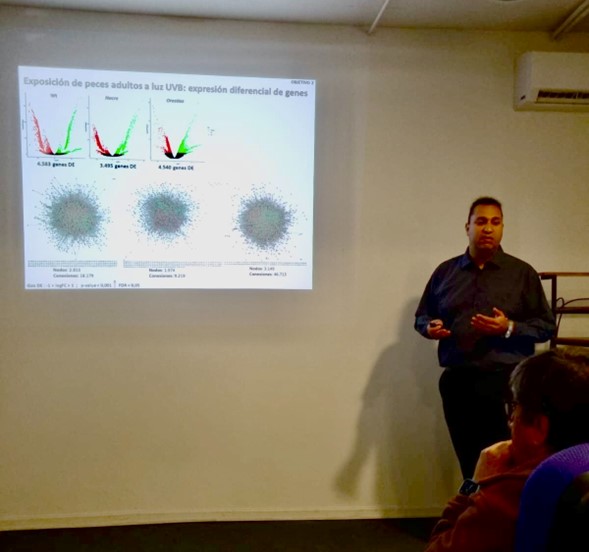In a new academic session, Doctoral Candidate in Biotechnology of the University of Chile and the CRG, Camilo Valdivieso, successfully defended his doctoral thesis, on the modulation of gene expression in fish in response to irradiation with ultraviolet B light (UVB). His research has been fundamental to the understanding of how organisms respond to UVB radiation exposure, revealing valuable data on the effects of this radiation on molecular physiology as well as on the mechanisms of adaptation to this natural condition.
Valdivieso’s research involved the use of a novel experimental approach and took advantage of a model animal, the zebrafish, and compared these with fish exposed to the highest doses of UVB on the planet: the Orestias fish of the Chilean altiplano. First, he exposed both wild zebrafish and albino mutants to UVB light and examined the transcriptomic responses. The zebrafish showed remarkable responses to UVB radiation. Dr. Valdivieso found that the absence of melanophores and pigments in the skin of albino fish leaves them vulnerablet o the effects of UVB radiation, causing oxidative stress and triggering inflammatory processes in their tissues.
The application of the same experimental approach to the endemic fish of the altiplano, Orestias ascotanensis, which inhabits the Salar de Ascotán in the Antofagasta Region, showed how this animal overcomes the high levels of UVB to which it is exposed daily. Valdivieso observed that the Orestias fish specifically activated stress response and DNA repair gene pathways, suggesting a unique adaptation to this extreme environment.
The results of Camilo Valdivieso’s thesis not only provide a deeper understanding of how fishes cope with UVB radiation, but also have important implications for the conservation of endemic species in high UVB radiation environments. Climate change and desertification of some environments presuppose an increase in the radiation rates to which many wild and domesticated species will be exposed.
This research marks a significant achievement in the field of molecular biology and ecology, and the thesis will serve as a basis for future research in this field. We congratulate Dr. Valdivieso for his outstanding work and for contributing to the advancement of knowledge and the protection of biodiversity.
